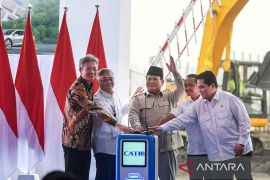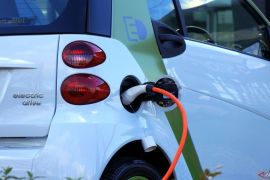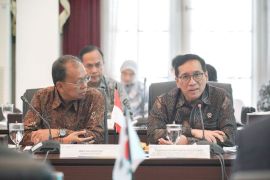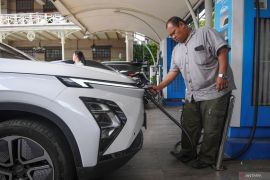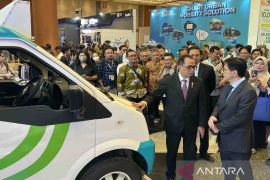This hope is what Coordinating Minister for Maritime Affairs and Investment Luhut Binsar Pandjaitan strives to realize as the "conductor" in the "orchestra" of EV industry development in Indonesia.
Nevertheless, he did not deny the fact that fossil fuel transportation is not the only contributor to air pollution in Indonesia.
Pandjaitan ensured that various policies of ministries and institutions are in harmony, so that the dream of changing people's habits from using fossil fuel vehicles to EVs could be realized.
EV population
The population of EVs in Indonesia has shown significant growth.
Based on data from the Ministry of Transportation's Type Test Registration Certificate (SRUT) as of January 22, 2024, presented by Director of the Maritime Industry, Transportation Equipment, and Defense Equipment of the Ministry of Industry Hendro Martono, there has been an increase of 262 percent in the population of two-wheeled battery-based EVs in Indonesia in 2023.
In 2022, the number of electric motorcycles in Indonesia stood at 17,198 units, which rose to 62,409 units in 2023.
This increase is a manifestation of the success of the government assistance program for the purchase of electric motorcycles, as stated in Industry Minister’s Regulation Number 6 of 2023 concerning Guidelines for Providing Government Assistance for the Purchase of Two-Wheeled Battery-Based Electric Vehicles.
Likewise, the population of electric cars also showed growth, albeit not as high as electric motorcycles.
The number of four-wheeled EVs in 2023 rose by 43 percent, from 8,562 units in 2022 to 12,248 units in 2023.
Despite the government having issued various incentive programs, the increase in the number of electric cars is not sufficient to boost the electric car industry in Indonesia.
Hence, to this end, the government has devised a new incentive program, namely import duty and sales tax on luxury goods incentives.
The incentives apply for the imports of electric cars in the Completely Built-Up (CBU) and Completely Knocked Down (CKD) categories
Incentive policy
The incentive programs are regulated in Investment Minister’s Regulation Number 6 of 2023 on Guidelines and Governance for the Provision of Import Incentives and the Delivery of Four-Wheeled Battery-Based Electric Vehicles in the Context of Accelerating Investment.
The regulation encompasses three types of tax incentives in every import scheme of electric cars. The incentives are provided to companies that are committed to investing in Indonesia.
The first scheme is for companies that import complete or CBU cars. For complete cars, the government exempts companies from import duties and luxury goods sales tax, and they only need to pay a value-added tax (VAT) of 11 percent of the selling price.
Hence, the cumulative tax is only 11 percent.
This scheme needs a bank guarantee and commitment from the companies to produce electric cars in Indonesia, where the number is equal to the number of imported electric cars, with a 1:1 ratio.
A bank guarantee is payment collateral given to the party receiving the collateral if the guaranteed party does not fulfill its obligations.
In this regard, Deputy for Infrastructure and Transportation Coordination at the Coordinating Ministry for Maritime Affairs and Investment Rachmat Kaimuddin explained that the incentives for imports will only apply until 2025.
Companies that have committed to investing are expected to start actively producing cars in Indonesia no later than early 2026. Import incentives will end in 2026, so 2026-2027 is the period for companies to pursue production targets for the number of cars imported in the 2024-2025 period.
Although Kaimuddin marked 2026-2027 as the production period, he is still encouraging electric car companies to start production as soon as they are ready.
If in the 2028-2029 period, an electric car company fails to achieve its production target, the company must return the government’s incentive funds in the amount of the difference between imported cars and domestically produced cars through a bank guarantee.
For instance, if a company imported five thousand electric cars in the 2024-2025 period but is only able to produce three thousand electric cars in Indonesia in the 2026-2027 period, then the company needs to pay back the electric car tax incentive to the government worth two thousand electric cars through a bank guarantee.
Thus, the bank guarantee plays a role in ensuring that companies that import electric cars to Indonesia are committed to the country’s EV industry development.
The second scheme is for companies that import electric cars with complete parts but are not yet assembled, or those in the CKD category, with a domestic component level below the requirements in the roadmap.
The domestic component level requirements based on the roadmap are a minimum of 40 percent until 2026, a minimum of 60 percent in 2027-2029, a minimum of 80 percent in 2030, and so on.
For companies that import electric cars with the second scheme, the government exempts them from import duties and luxury goods sales tax and only requires them to pay VAT of 11 percent of the selling price.
Hence, the cumulative tax in the second scheme is the same as the first scheme, namely 11 percent.
The third scheme applies to companies that import electric cars with a CKD condition with a domestic component level that has met the requirements in the roadmap.
In this scheme, the government exempts companies from import duties and luxury goods sales tax and only requires them to pay VAT of one percent of the selling price, different from other schemes whose VAT is 11 percent.
The VAT incentive of 10 percent is regulated in Finance Minister’s Regulation Number 8 of 2024 on VAT on the Delivery of Certain Four-Wheeled Battery-Based Electric Vehicles and Certain Battery-Based Electric Buses Borne by the Government for the 2024 Fiscal Year.
Hence, the cumulative tax in the third scheme is only one percent.
The requirements for the third scheme refer to Industry Minister’s Regulation Number 36 of 2021 concerning Low Carbon Emission Vehicles, or LCEV, which regulates the requirements for the LCEV program and includes investment, domestic component level, as well as other vehicle technical aspects.
The three schemes reflect the commitment of various relevant ministries and institutions to develop the EV industry in the country to realize cleaner air for all citizens.
Related news: Indonesia's two-wheeled EV sales surge 262 percent in 2023
Related news: Govt offers incentives for investors willing to build EV factories
Related news: Electric cars are future of Indonesia's automotive industry: Jokowi
Translator: Putu Indah, Raka Adji
Editor: Azis Kurmala
Copyright © ANTARA 2024

